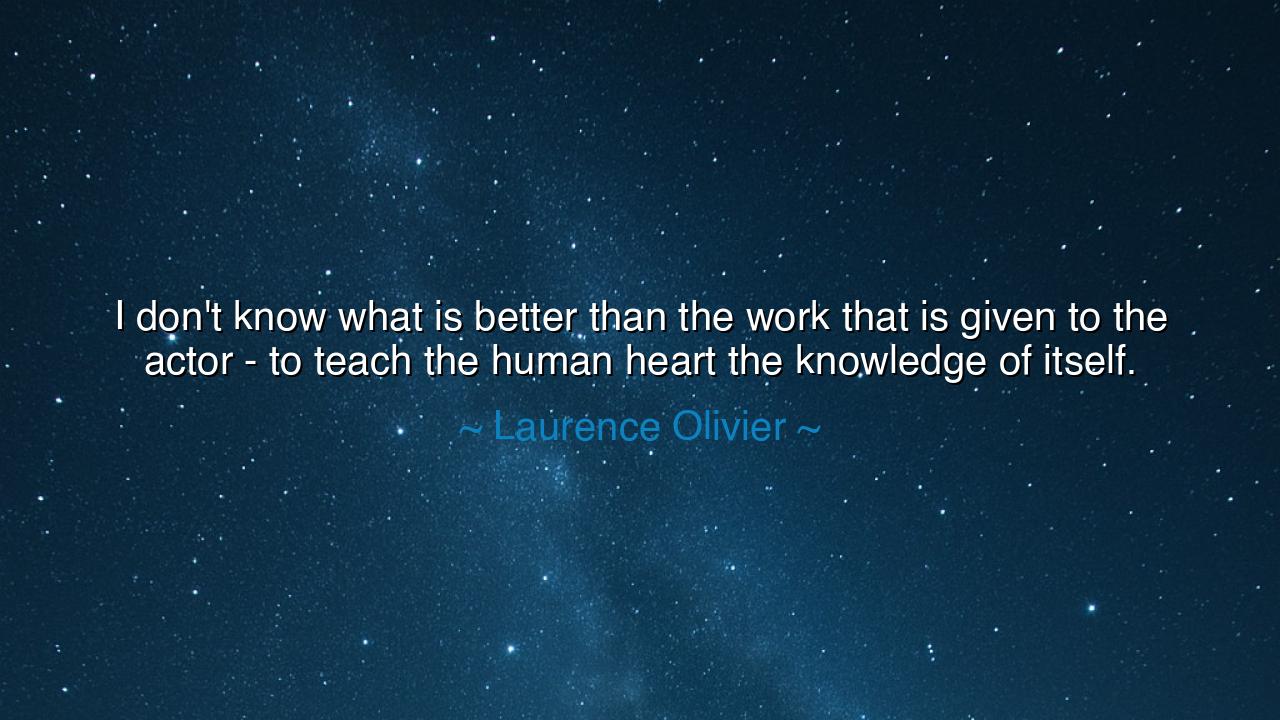
I don't know what is better than the work that is given to the
I don't know what is better than the work that is given to the actor - to teach the human heart the knowledge of itself.






Laurence Olivier, master of the stage and voice of living drama, once declared: “I don’t know what is better than the work that is given to the actor – to teach the human heart the knowledge of itself.” In this profound reflection, he reveals the sacred calling of the actor: not to entertain alone, not to dazzle with costumes or applause, but to awaken in men and women the deepest truths of their own souls. For what is art, if not a mirror held to the heart? And what greater gift can one human give another than the revelation of their own hidden self?
The ancients knew this truth well. In the theaters of Athens, the tragedies of Aeschylus, Sophocles, and Euripides were not written to amuse idle crowds, but to stir the conscience of the city. When Oedipus blinded himself, the people wept not for him alone, but for the blindness within themselves. When Antigone defied the king for the sake of a higher law, they saw their own struggle between duty and justice. These plays, performed by actors upon simple wooden stages, taught the human heart to know itself, to feel its hidden fears, its secret courage, its terrible capacity for both love and destruction.
Olivier himself embodied this tradition. When he stepped into the roles of Shakespeare’s kings and villains, he did more than recite lines; he became a vessel of human truth. His Hamlet, torn between action and hesitation, taught audiences the cost of indecision. His Richard III, monstrous yet charismatic, revealed the dark ambition that lurks in all souls. Through his craft, Olivier showed that the actor is not merely a performer, but a teacher of humanity, unveiling to each heart the knowledge it often resists.
Consider also the story of Harriet Beecher Stowe’s Uncle Tom’s Cabin, later adapted for the stage. Its performances were not mere plays but revelations, awakening a nation to the cruelty of slavery. Crowds who had turned away from political debate could not turn away from the sight of suffering brought to life before their eyes. Here was the power Olivier described: the actor, through art, teaching the human heart what it did not wish to see, but what it desperately needed to know.
The lesson is luminous: art is not trivial. The stage, the screen, the story told through living breath—these are not luxuries of leisure, but instruments of truth. For there are truths too great for cold words, truths that must be felt in the marrow of the soul. The actor, by embodying joy and sorrow, betrayal and redemption, gives shape to these truths and offers them to the audience, who in turn discover themselves in the reflection of another’s life.
Practical action follows. Do not dismiss the power of art, whether on the stage, in film, or in literature. Seek stories that awaken, not only amuse. Support those whose work brings forth honesty and depth. When you watch, do not watch idly—ask yourself: What of myself do I see here? What do I fear? What do I long for? What must I change? And if you yourself create, whether in acting, writing, or any form, remember Olivier’s wisdom: the highest calling is to give the heart knowledge of itself.
Thus, children of the future, remember the teaching of Olivier: the work of the actor is the work of the soul. It is to teach men and women who they truly are, to strip away masks and illusions, to awaken tears where the heart is hardened, and to kindle hope where despair has taken root. To teach the human heart the knowledge of itself is not only the work of the actor—it is the work of every life lived with courage and truth. And in this work, there is no calling greater.






AAdministratorAdministrator
Welcome, honored guests. Please leave a comment, we will respond soon